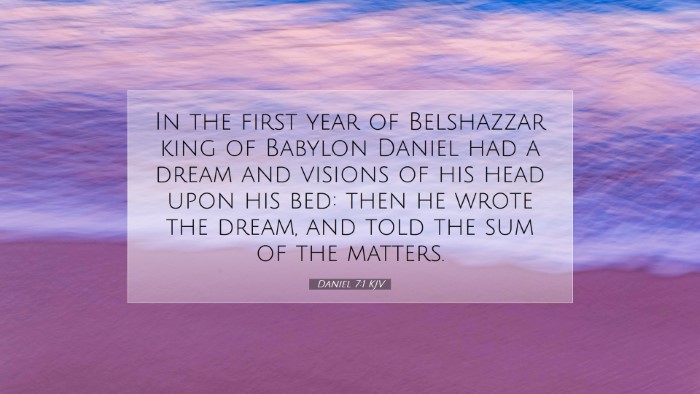Commentary on Daniel 7:1
Daniel 7:1 states, "In the first year of Belshazzar king of Babylon Daniel had a dream and visions of his head upon his bed: then he wrote the dream, and told the sum of the matters." This verse sets the stage for one of the most significant prophetic sections of the Book of Daniel. The complexities of this vision and its implications stretch deeply into biblical prophecy and eschatology.
Contextual Overview
In order to fully appreciate the implications of Daniel 7:1, it is crucial to understand the historical and cultural context in which the vision occurs. Belshazzar, the king mentioned, is historically known as the last ruler of Babylon before the Medes and Persians conquered it. This verse signifies not only a personal experience of Daniel but also a pivotal moment in Israel's history as they grapple with political oppression and the prophecy of restoration.
Historical Significance
- Year of the Vision: The first year of Belshazzar’s reign is significant as it heralds the decline of Babylon and sets the tone for the coming shifts in power that Daniel is to prophesy.
- Daniel’s Position: Daniel held a prominent position in the Babylonian court, which adds a layer of complexity to his role as a prophet providing guidance amidst tumultuous times.
Analysis of the Text
Matthew Henry's commentary emphasizes the intimate connection between divine revelation and human perspective. Daniel's dream and visions are not merely personal experiences; they are crucial revelations from God concerning future events affecting nations and peoples.
Divine Revelation
Henry suggests that the dream signifies the divine control over world events. God uses dreams as a means of communication, revealing not just the future but also His sovereignty over human history. This point is echoed in the writings of Albert Barnes, who emphasizes the theological implications of God’s omniscience and omnipotence as expressed through prophetic dreams.
The Nature of the Dream
Adam Clarke elucidates the dual nature of the dream as both a personal revelation to Daniel and a corporate message to the Israelites, symbolizing God's assurance that despite their current oppression, He is Sovereign and in command. The visions to come reflect future kingdoms and the ultimate victory of God’s eternal kingdom.
Literary Structure
The verse introduces the apocalyptic literature style that characterizes much of Daniel’s writings. This literary style often employs profound imagery and symbolism, which necessitates careful interpretation. As Clarke points out, the use of dream literature serves a dual role: it is a means of revealing hidden truths while also inviting the reader into deeper contemplation about God's plans.
Writing the Dream
- Importance of Documentation: Daniel's act of writing the dream reflects the significance of documentation for posterity. It emphasizes accountability and the importance of preserving divine messages for future generations, a sentiment echoed in Henry's observations on the preservation of God’s word.
- Defining the Matter: The “sum of the matters” highlights Daniel’s role as an interpreter. He is not only a witness but also a commentator, bridging the gap between divine intent and human understanding.
Theological Implications
The intersection of history, prophecy, and theology cannot be overstated in Daniel 7:1. The verse invites readers to consider how prophetic literature speaks to the relationship between God and His people amid adversity.
God’s Sovereignty
Barnes emphasizes that the dreams reflect God’s ultimate authority over nations and their rulers. This is crucial for understanding the broader eschatological implications that unfold throughout the Book of Daniel, culminating in the prophetic visions of the enduring kingdom of God.
Hope amid Oppression
As the Israelites faced the harsh realities of Babylonian captivity, this dream provided much-needed hope. Clarke infers that through Daniel’s revelations, God reassures His people of eventual deliverance and the reinstatement of His covenant promises.
Conclusion
In summary, Daniel 7:1 is not merely an introduction to a vision but a profound declaration of divine sovereignty, prophetic purpose, and a reminder of hope amid trials. It encapsulates the essence of God’s engagement with humanity, sovereign control over history, and the promise of ultimate restoration. This verse, with its rich theological depths, serves as a foundation for understanding the prophetic elements found in the following chapters of Daniel, inviting pastors, theologians, and scholars to delve deeply into its meaning.


